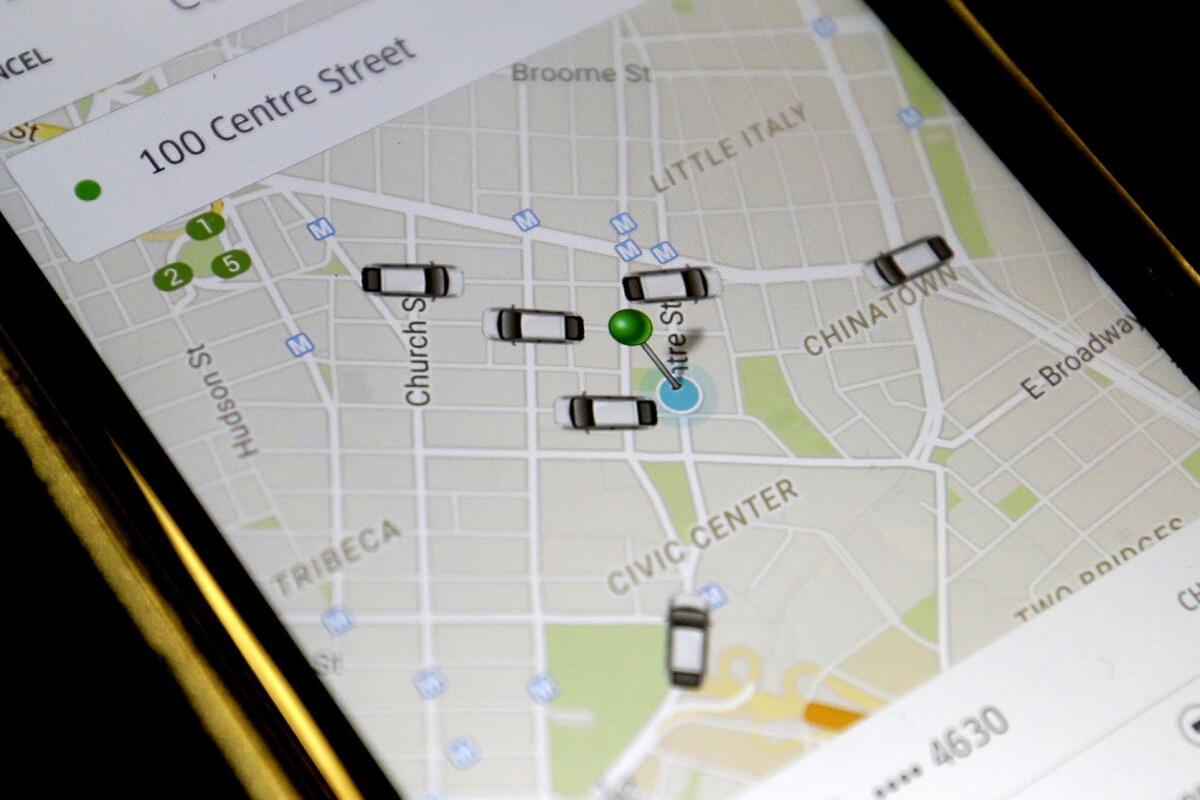Uber, Lyft, DoorDash launch a $90-million fight against California labor law

- Share via
SACRAMENTO — Launching what could become one of the most expensive issue campaigns in California history, a trio of Silicon Valley gig-economy companies on Tuesday unveiled a ballot measure to exclude many of those they pay for work from being considered benefits-earning employees.
The proposal, which Uber, Lyft and DoorDash intend to qualify for the statewide ballot next November, states that an “app-based driver is an independent contractor” as long as a series of conditions are met by a company. If approved by voters, the initiative would also enshrine in state law a number of perks for those workers, including a minimum amount of pay as well as insurance to cover work-related injuries and auto accidents. And it lays out details for healthcare subsidies, protections against on-the-job harassment or discrimination and a system to enforce some workplace rights.
“Work choice is a critical component to our state’s economic success and growth,” said David Nelson, public policy director of the California Asian Chamber of Commerce, who said that many Asian restaurants now have access to new customers through app-based deliveries. “Forcing ride-share and delivery drivers to become employees would significantly limit the availability and affordability of these services to exist.”
Many of the initiative’s promised benefits reflect criticisms leveled against the companies by supporters of Assembly Bill 5, the new law taking effect in January that will apply a series of rigorous new tests a company must meet before excluding workers from being designated as an employee. How to properly determine a worker’s job status was the key finding in a far-reaching ruling by the California Supreme Court in 2018 that significantly reduced the number of situations in which a person can be considered an independent contractor. Lawmakers spent months deciding whether to limit the ruling’s impact on some businesses and to what extent.
Signed into law by Gov. Gavin Newsom last month, AB 5 was at the center of an intense state Capitol battle between organized labor and business groups. Companies representing a wide swath of the state’s economy — physicians, accountants and investment advisors, among many others — were carved out of the new law, insisting their operations would suffer or cease to exist if they were forced to provide benefits and extend rigorous workplace rules to more people currently paid as independent contractors. Many other industries were not exempted, and lawmakers have promised to consider additional changes when they return to Sacramento in January.
Assemblywoman Lorena Gonzalez (D-San Diego), the author of AB 5, accused Uber, Lyft and DoorDash of focusing solely on corporate profits, regardless of the impact on individual workers.
“They’ve never moved from their position of giving workers half of what they deserve,” Gonzalez said Tuesday. “It’s massive income inequality.”
The spring and summer debate also marked the political debut of California’s app-based companies, whose business model dominated much of the discussion over the law’s impact. In August, the three companies said they would ultimately submit a proposal for next November’s statewide ballot, convinced they would fail to get their demanded protections through legislative negotiations. Ride-hailing services Uber and Lyft said they would commit a combined $60 million to fund the statewide initiative , with food delivery service DoorDash later announcing it would spend $30 million.
But exactly what the companies would ask California voters to enact wasn’t clear until the 17-page proposal was submitted to the state attorney general for review on Tuesday.
In many ways, the initiative seeks to offer remedies to some of the biggest complaints lodged by drivers and labor activists. The ballot measure states, for example, that all tips paid by customers will go to drivers and will not result in a driver being paid less money — while also establishing a minimum pay of 120% of California’s minimum wage, scheduled to rise statewide to $13 an hour for most businesses next year.
Drivers would also be paid a 30-cents-per-mile fee for expenses such as gas and vehicle maintenance, an amount to be adjusted annually for inflation. And it promises driver protections that will exist even if a person chooses to work with more than one company. A driver could receive a healthcare stipend from multiple app-based companies. Supporters said that the initiative would create a system where drivers who work 25 hours a week or more would receive a stipend large enough to cover 82% of the cost of the least expensive insurance plan offered under the Covered California exchange.
Criticisms have hounded the companies over driver and passenger safety. The initiative requires criminal-background checks and bans on drivers convicted of certain felonies and of driving under the influence of alcohol or drugs. It also requires companies to provide safety training and gives those drivers until July 1, 2021, to complete the courses provided.
But Gonzalez said the provisions appear to offer the gig-economy drivers less in overall rights and wages than they will receive under the 2018 court ruling or AB 5 when the law takes effect. In particular, she questioned the details of how the minimum wage guarantees would work and the apparent lack of worker compensation benefits and unemployment insurance. And she rejected the claims of the companies that they will be held to rigid rules under her legislation.
“There’s nothing in AB 5 that doesn’t allow for flexibility,” she said.
Labor groups vowed to fight the ballot measure.
“These CEOs are attempting a big-money veto to undo labor protections the bipartisan California Supreme Court, the California Legislature and the governor all agree on,” said Art Pulaski, executive secretary-treasurer of the California Labor Federation. “No corporation should be above the law, no matter how much they spend on political campaigns to rig the rules in their favor.”
The proposal is a latecomer to the 2020 ballot measure process. Most supporters of likely measures had their initiatives vetted by state officials weeks or months ago and are already collecting voter signatures. The relatively late start for the tech companies means they will likely have to pay more to circulate petitions, with the ultimate goal of gathering more than 623,000 valid voter signatures by spring of next year.
Brandon Castillo, a spokesman for the initiative campaign, said other app-based companies are expected to join the effort between now and next November.
“We’re going to spend what it takes to win,” he said.
More to Read
Sign up for Essential California
The most important California stories and recommendations in your inbox every morning.
You may occasionally receive promotional content from the Los Angeles Times.











